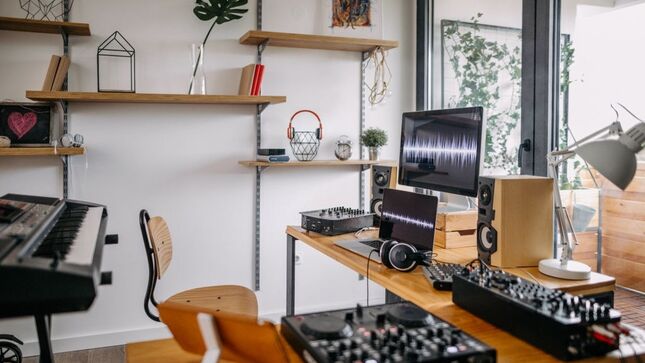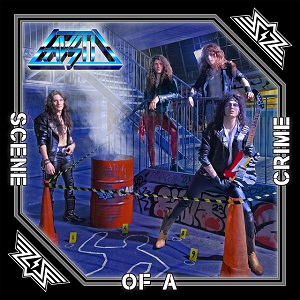What Do I Need For A Home Studio?
October 20, 2021, 3 years ago

Having a home recording studio is something that is now becoming quite common among music producers, artists, and even hobbyists.
The thing about the modern recording studio today is that it really doesn't take much to start producing music.
Recording professional music from the comfort of your home is now more possible than ever.
Over the past 20 years, improving the affordability of home recording studio equipment has completely changed the way artists produce and release their music.
With the right equipment, you can quickly start turning the music in your head into real songs.
To help you put together your perfect space, we've compiled a list of things you need to build a home recording studio.
Choosing a Digital Audio Workstation (DAW)
A digital audio workstation (DAW) is the main software you use to record and produce music on your computer.
There are many different DAWs on the market, such as Pro Tools, FL Studio, Ableton Live, Cubase, Logic Pro, Reaper, and Bitwig.
Some thrive on audio tracking and editing, like Pro Tools, while others are geared toward producing and arranging beats, like FL Studio or Ableton Live.
Personally, I would recommend the Pro Tools option to those who are willing to spend that much. But for most people, the Presonus options are priced slightly more reasonably for beginners.
An Audio Interface
An audio interface is the main hardware device that allows your computer to communicate with your computer. Connect the equipment to the interface and the interface to the computer.
Effectively replace your computer's built-in sound card. While this is the basic function of an audio interface, many have other characteristics.
Depending on the model, the audio interfaces can also act as microphone or headphone preamps, DI units, digital converters, etc.
Most people choose to use a USB audio interface. This home recording studio equipment allows you to connect your microphone, speakers, and headphones to your computer.
A MIDI Controller
MIDI keyboards are not necessarily critical for your home recording setup, but they are good to have on hand regardless of the genre or style of music chosen.
When it comes to producing music on your computer, unless you have a MIDI controller, you are missing out on playing virtually thousands of instruments on your computer.
Sure, playing and recording a real instrument, for example a guitar, would be the best artistically.
Sure, you can program notes in your DAW by clicking on the notes, but without a MIDI controller, adding expression and feel to your MIDI recordings will be difficult.
A MIDI controller allows you to play virtual instruments expressively with the use of keys, drum pads, effect knobs, pitch bend wheels, and other controls.
Computer
This is the brain of your studio and can be used to record MIDI, audio, mix your tracks, and more.
Considering your computer's processor and RAM speed is important, whether you're using a PC or Mac, you'll need a fair amount of hardware space as well.
Your computer is the heart of your home recording studio. We can't stress this enough - when you're starting out, it's perfectly fine to use the laptop or desktop you already own.
Most likely, it's already powerful enough to run most commercial music-making software and plug-ins.
For those who want to step up and purchase a separate computer for music production purposes, it can be a dramatically different purchasing process than what you are normally used to.
Generally speaking, a laptop or desktop with at least 16GB of RAM, running on a Core i5 processor, is a good start.
However, you will almost always have more years of building your own custom music production PC, compared to a laptop.
And when it comes to computers for recording and production, your friends are faster storage drives, bigger RAM, and CPUs.
But from experience and as a fan of mobile music production, most producers can produce decent music without the need for supercomputers.
Headphones
Like studio monitors, studio headphones are designed for precision listening. This means that the treble and bass curves normally applied to everyday headphones are lowered in favor of a flat frequency response.
The most common headphones for recording are the closed type. This prevents sound from leaking from the headphones into the microphone when you are recording.
The closed earphones are sealed at the back, which means that the sound is more isolated and will not spill out of the earphones. This makes closed-back headphones a great choice for recording, as sound from the headphones is less likely to leak into the microphone.
Open ear cups allow air to flow through. This means that more sound will escape, but for the benefit of a more natural sounding listening experience. Open headphones are a great option for mixing and mastering.
Conclusion
Now that you have an idea of the home studio essentials you'll need for a successful home recording studio, you can go ahead and do some more research before purchasing the gear.
I've only included 10 studio teams on this list because I know how easy it is to get GAS (Gear Acquisition Syndrome) syndrome as an aspiring music producer.
Remember to work with what you have and use it to your creative advantage, rather than obsessing over buying more studio equipment.











